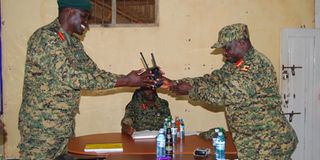Uganda, DR Congo to host crisis talks over rebels

Duty. Maj Gen Peter Elwelu (right), hands over office to Brig Paul Lokech at the Second Division Army Barracks in Makenke, Mbarara at the weekend. PHOTO BY FELIX AINEBYOONA
What you need to know:
Troubled waters. UPDF is concerned that instability in eastern DRC could spill over the border
Mbarara.
The resurgence of “negative elements” in eastern Democratic Republic of Congo (DRC), among them the Allied Democratic Forces (ADF) rebels, poses a “danger” to Uganda’s security, the army has warned.
Gen David Muhoozi, the new Chief of Defence Forces, said: “ADF and some other negative forces are still alive in DRC and are an issue of concern”.
“They are potentially dangerous to the security of Uganda which [the new UPDF 2nd Division Commander Brig Paul Lokech] knows very well that [he] will need to solve, most especially [the] many negative forces still at large in DRC,” he added.
Gen Muhoozi made the comments at the weekend as the new UPDF Land Forces Commander Maj Gen Peter Elwelu handed over his former office, as UPDF 2nd Division commander, to Brig Lokech.
Gen Muhoozi did not provide specifics of the threat posed by the ADF whose capacity the Ugandan military said had been degraded after the Congolese army three years ago overran the rebels’ headquarters.
In February 2014, DRC leader Joseph Kabila telephoned President Museveni to convey news of the expulsion of ADF upon which, according to a State House statement issued at the time, Mr Museveni “thanked and praised” the successful operation.
There has, until now, been no mention by Uganda’s security of ADF re-grouping in eastern DRC after Tanzania in April 2015 arrested its leader Jamil Mukulu who was extradited and is now facing prosecution in Uganda on multiple murder and terrorism charges. The DRC convicted him in absentia of similar charges and sentenced him to death in late 2014; three years after the United Nations placed him on its sanctions list.
The latest Uganda army warnings about renewed ADF activity come in the wake of diplomatic friction between Kinshasa and Kampala. Kinshasa accuses Kampala of aiding M23 rebels, whose military commander Sultan Makenga, mysteriously vanished from a round-the-clock UPDF watch in Uganda.
Before a UN-backed regional offensive involving the South African army pounded the M23 out of eastern Congo, where they had captured the important Goma city, Kabila’s government had accused Uganda and Rwanda of providing financial and logistical support to the rebels. The two countries denied the allegations.
In an interview yesterday, Uganda’s Defence and Military spokesman Brig Richard Karemire said the “fluid security situation” in eastern DRC is a concern to the region. As such, he said, a Joint Follow-up Mechanism has been mooted under the aegis of the 12-member International Conference on the Great Lakes Region (ICGLR) to enable sharing of intelligence and logistics in ending instability with cross-border ramification.
“Uganda will provide the leadership and host it in Kasese District ...the launch will be on Saturday,” he said.
Gen Muhoozi, in apparent reference to Kinshasa’s allegations, had at the weekend said Uganda would never support belligerent forces to destabilise a neighbouring country.He tasked Brig Lokech to ensure the soldiers under him keep western Uganda, which has hundreds of kilometres straddling the vast DRC border, safe for uninterrupted commerce.
The rebels
Hundreds of the defeated M23 rebels were taken in by Uganda, as a temporary measure, pending their repatriation to DRC upon Kabila’s government fulfilling terms of the Nairobi pact. That plan stalled and M23 military commander Makenga disappeared mid last month before the UPDF, days later, announced that it had intercepted truckloads of the insurgents in Mbarara District headed to their former lairs in eastern DRC.



